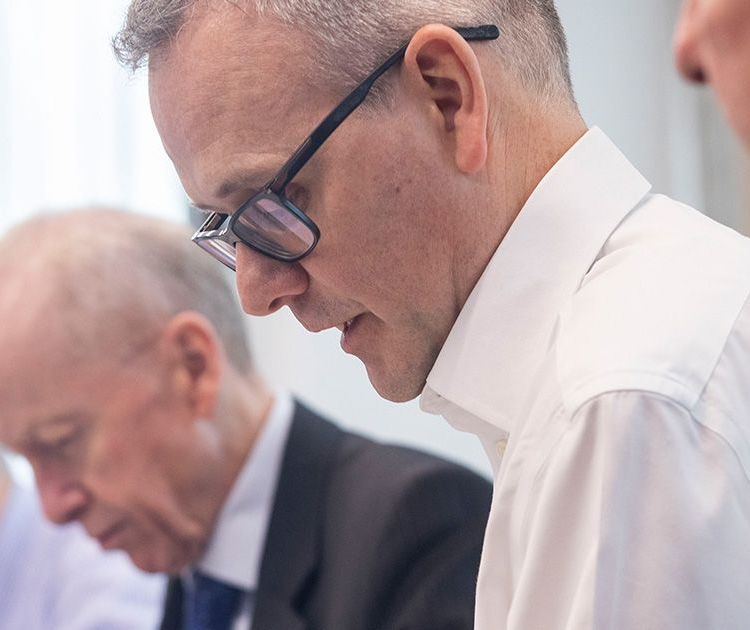The Board has established the following Committees, all of which operate within a scope and remit defined by specific terms of reference determined by the Board
| Name | Audit Committee | Remuneration Committee | Compliance Committee |
Health, Safety, Environment,
Security and Risk Committee |
|---|---|---|---|---|
| Joseph Pagop Noupoué | X | X | X | |
| Sir Stephen O’Brien | X | X (Chair) |
X |
|
| Sarah Clark | X | |||
| David Clarkson | X (Chair) | X | X (Chair) | |
| Dr Djamila Ferdjani | X | X | ||
| Mark Iannotti | X (Chair) | X | X | |
| Steve Jenkins | X |
Committee members:
- Mark Iannotti (Chair)
- Sarah Clark
- Sir Stephen O’Brien
The Audit Committee is chaired by Mark Iannotti, who, along with its other members, Sarah Clark and Sir Stephen O’Brien are considered to be independent Non-Executive Directors of the Company. Mark is considered by the Board to have recent and relevant financial experience and the Committee as a whole has competence relevant to the oil and gas industry. If required, at the request of the Chair of the Committee, the Chief Executive Officer, the Chief Financial Officer and other members of the senior management team are also invited to attend meetings.
The terms of reference of the Committee reflect the current statutory requirements and best practice proportionate to a company of Savannah’s size, nature and state of development. Where there is an overlap of responsibilities between the Audit, Compliance and Health, Safety, Environment, Security and Risk Committees, the respective Committee Chairs have the discretion to agree which is the most appropriate Committee to fulfil any obligation.
The role of the Committee is to assist the Board in discharging its oversight responsibilities with regards to: monitoring the Company’s financial reporting processes and the integrity of the Company’s financial statements (including monitoring the preparation of the annual and half yearly accounts and reports and any other formal announcement relating to its financial performance). The Committee also oversees and monitors the audit of the Company’s financial statements and the independence of the external auditors. Any significant findings raised by the external auditors during their review of the half-yearly results or the audit of the full-year results are reviewed and discussed by the Audit Committee and reported or referred to the Board as appropriate.
The key responsibilities of the Committee are:
- Advising the Board (independently of the Executive Directors and external auditor) whether considers the Company’s corporate reporting including the Annual Report and Accounts to be fair, balanced and understandable;
- Monitoring the Company’s financial reporting processes and the integrity and content of the Financial Statements, including reviewing, reporting and making recommendations to the Board on significant financial reporting issues and judgements;
- Reviewing whether, and in what form, the Company will have an internal audit function;
- Monitoring, overseeing and assessing the Group’s strategy and framework of policies, procedures, systems and controls to identify, assess, manage and report on compliance matters, including the prevention and detection of fraud and tax evasion;
- Reviewing and approving the annual audit plan and reviewing the audit findings with the external auditor, and
- Assessing external auditor objectivity and independence and reviewing the performance and remuneration of the external auditor.
The Committee is required to meet at least three times a year.
Committee members:
- David Clarkson (Chair)
- Dr Djamila Ferdjani
- Mark Iannotti
- Joseph Pagop Noupoué
The Committee is chaired by David Clarkson and its other members are Dr Djamila Ferdjani, Mark Iannotti and Joseph Pagop‐Noupoué. All members of the Committee are independent Non-Executive Directors. The Chief Executive Officer and other members of the senior management team are also invited to attend meetings when considered appropriate. The role of the Committee is to recommend the remuneration principles, including benefits and rewards, for the executive directors to the Board and propose a remuneration policy for adoption by the shareholders.
The key responsibilities of the Committee are:
- Determining and agreeing the Company’s remuneration policy with the Board;
- Defining and establishing remuneration for the Non-Executive Chair, the Executive Directors, and the senior leadership team;
- Reviewing and determining the remuneration policy across the Group, and
- Determining that remuneration, benefits and rewards are designed and aligned to achieve the goals, strategy and values of the Company.
The Committee is required to meet at least twice a year.
Committee members:
- Sir Stephen O’Brien (Chair)
- David Clarkson
- Mark Iannotti
- Joseph Pagop Noupoué
The Compliance Committee is chaired by Sir Stephen O’Brien and its other members are David Clarkson, Mark Iannotti, and Joseph Pagop Noupoué. All of them are considered to be independent Non-Executive Directors, apart from Nick Beattie who is an Executive Director.
The role of the Committee is to support the Board in carrying out its duty to promote and oversee compliance with all legal and regulatory obligations. The terms of reference of the Committee outline its key responsibilities and reflect the current statutory requirements and best practice proportionate to a company of Savannah’s size, nature, and stage of development.
The key responsibilities of the Committee are:
- Reviewing and monitoring compliance controls, policies and systems to identify, assess, manage and report on compliance matters, including:
- Maintaining adequate compliance procedures, policies and systems;
- The prevention of bribery, corruption and money laundering and countering of terrorist financing;
- Gifts and hospitality, per diem payments and business relationships, including dealings with public officials, agents, intermediaries, consultants, contractors and advisers;
- Mergers, acquisitions and major new projects;
- Whistleblowing arrangements and reports;
- Conflicts of interest; and
- Legal and regulatory compliance risks;
- Assessing the adequacy and effectiveness of the compliance framework; and
- Communicating the Board’s commitment to compliance to the Group’s staff, contractors and other stakeholders.
The Committee is required to meet at least four times a year.
Committee members:
- David Clarkson (Chair)
- Dr Djamila Ferdjani
- Steve Jenkins
- Sir Stephen O’Brien
- Joseph Pagop Noupoué
The Committee is chaired by David Clarkson and its other members are Dr Djamila Ferdjani, Steve Jenkins, Sir Stephen O’Brien, and Joseph Pagop‐Noupoué. All of them are considered to be Independent Non-Executive Directors.
The role of the Committee is to oversee the management of safety and operational sustainability, and the systems and processes deployed to enable focus on the most potentially material in the matter of delivering the Company’s goals for safe, secure, and sustainable business.
The key responsibilities of the Committee are:
- Monitoring and testing:
- The Group's performance in respect of safety, operational integrity, and sustainability; and
- The effectiveness of the Group's systems of internal control for safety, operational integrity, and operational sustainability matters, including applicable management systems, policies, practices, processes, leadership, and culture;
- Monitoring the management and mitigation of the principal risks allocated to the Committee by the Board and such emerging risks as the Committee may determine fall within its scope from time to time;
- Reviewing and testing management response to relevant Group reports and the finding of selected safety investigations; and
- Reviewing the Company’s annual sustainability report and such other materials intended for disclosures or publication as may be allocated to the Board from time to time.
The Committee is required to meet at least four times a year.



